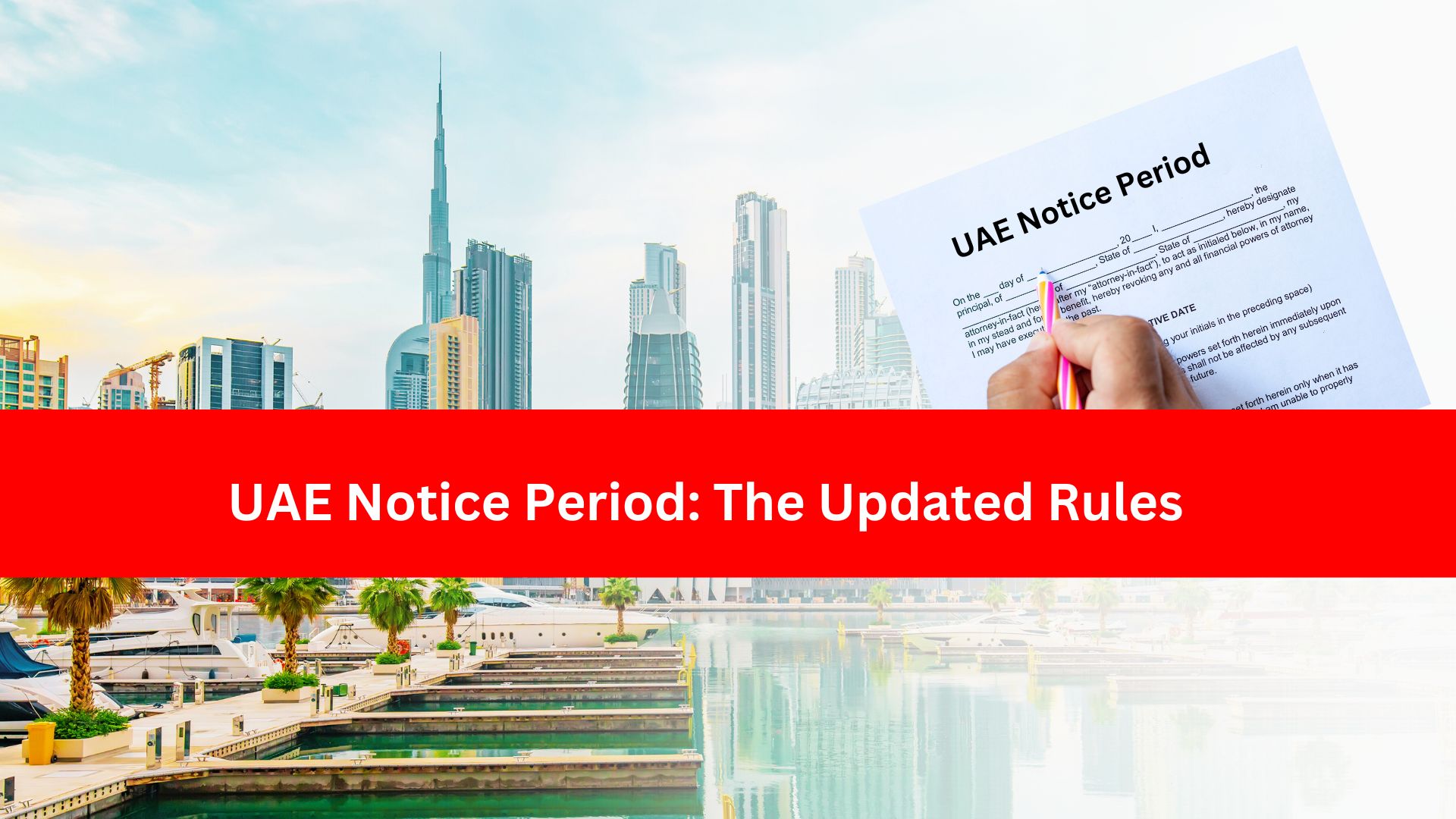For employers and employees to follow when terminating their employment connection, notice periods are essential parts of employment contracts in the United Arab Emirates. Within the context of the UAE’s legal system, we examine the particulars of the most recent regulations covering notice periods. Considering the most recent changes, it’s critical to understand these rules in order to guarantee a polite and legal termination of employment agreements.
The revised statutes offer both parties precise guidelines that specify their rights and obligations during the notice period as well as the repercussions of breaking the rules. We hope to provide you with a comprehensive grasp of the UAE’s notice period rules and best practices for a seamless transition, whether you’re an employer preparing to handle a staff leave or an employee considering a resignation.

UAE’s Notice Period Laws
An overview of the laws governing notice periods in employment
The notice period is a crucial component of the employment structure in the United Arab Emirates. It’s a period of time that must pass before an employment contract is terminated by the employer or by you, the employee. This time acts as a safety net, giving both sides time to get ready for the impending shift.
The length of the notice period is determined by UAE labour rules and varies based on the kind of contract and length of employment. The normal notice time for contracts that are limitless is thirty days. On the other hand, it might vary from a minimum of 30 days to a maximum of 90 days for limited contracts.
During probation, a shorter notice period of 14 days is typically required.
Latest Updates on the Notice Period
The regulations pertaining to notice periods have been clarified by updates to UAE labour legislation. The notice period should last between 30 and 90 days, with 90 days being the maximum under the new labour rules. These modifications emphasise how crucial it is to adhere to the notice period unless there are special circumstances that allow you to skip it.
For example, Article 121 of the nation’s labour law specifies that an employer may end an employment contract without giving notice if there are good grounds for doing so. On the other hand, you can be subject to legal action for violating the terms of your employment contract if you quit without providing notice and without a good reason.
It’s Critical That Employers and Employees Understand New Regulations
The revised notice period requirements in the United Arab Emirates must be understood by both employers and employees. These rules are necessary for handling job changes in the dynamic labour market of the United Arab Emirates. When a job is about to end, employers are required to give a formal notice and specify how long the notice will last.
It is your responsibility as an employee to let your employer know if you plan to follow the termination notice. Understanding these rules guarantees that the termination procedure proceeds lawfully and without incident. Additionally, it protects the rights of both sides; for instance, UAE labour laws shield workers against wrongful termination.
If you choose to leave a fixed-term contract before its expiration, you might have to pay a penalty for the early termination. It’s important to remember that the notice period may be changed with your consent and the consent of your employer. Adjustments to meet the unique requirements of the job relationship are made possible by this flexibility.
You will be paid for your work until you go, and the process for getting paid during the notice period is simple.
Updated Guidelines on Notice Periods
Notice Periods for Limited Contracts: It’s crucial for HR professionals to specify the notice period in the employment contract to avoid any misunderstandings for employees under a limited contract. Employees are expected to continue performing their duties with dedication until their contract ends.
Notice Periods for Unlimited Contracts: Generally, the notice period is 30 days, but it can be extended if both parties agree and document this change formally. Employees should continue to contribute to the organization and will receive their usual pay and benefits until the notice period ends. If an early termination is desired by either side, it may be possible to arrange for compensation in lieu of notice.
Special Provisions for High-Level and Specialized Roles: For those in senior or specialized roles, the notice period might include specific terms due to the importance of their responsibilities. These conditions should be clearly outlined to prevent any misunderstandings. In cases of severe misconduct or significant breaches of contract, an employer may terminate the employment sooner. Conversely, if an employer fails to meet their contractual obligations significantly, such as failing to pay salaries or ensuring safety, the employee in a high-level or specialized role may terminate their employment immediately.
During the notice period, both parties are encouraged to maintain open communication and work together for a smooth transition. This includes conducting exit interviews to gather feedback. Also, employment can be terminated without notice during the probation period.
Legal Recourse: If there is wrongful termination, grievances can be filed with the Ministry of Emiratisation and Human Resources (MoHRE). Resigning without adhering to the notice period could lead to legal consequences for breach of contract.
For employees on limited contracts, leaving before the end of the contract could necessitate compensation for early termination. Being aware of these regulations is vital for compliance with labor laws and maintaining a professional and respectful workplace environment.
Legal Obligations During the Notice Period
Employee Rights and Employer Duties: During the notice period, employers must allow employees one day off each week to look for new job opportunities, without any reduction in salary. Employees can choose which day to take off, but they must inform their employer three days in advance.
Compensation for Not Honoring Notice Period: If an employee does not observe the notice period, they are required to compensate the employer. This compensation is equal to the employee’s wage for the notice period or its remaining duration.
Resignation During Probation: An employee who wishes to resign during their probation period and plans to leave the UAE must provide a 14-day notice. If the employee intends to switch to another employer within the UAE, a 30-day notice is required. In this scenario, the new employer must reimburse the previous employer for recruitment and contracting costs.
Immediate Resignation Under Exceptional Circumstances: Employees can resign immediately without notice under specific exceptional circumstances, such as:
- Violations of their rights as outlined in the Labour Law or their employment contract.
- Assault by the employer or their legal representative.
- Unaddressed serious safety and health risks.
- Being required to perform tasks significantly different from the agreed-upon role without their consent.
End of Service Benefits and Entitlements: End-of-service benefits should be calculated based on the last received wage and are payable regardless of who initiated the termination of the contract. If agreed upon by both parties, the notice period can be shortened or waived without infringing on any rights.
Consequences for Employers Not Complying with Notice Period Laws: Employers who do not adhere to the notice period regulations face penalties. They must compensate the employee an amount equal to the salary for the notice period or its unexpired portion, based on the last wage paid. Employers are also required to provide written notification specifying the duration of the notice period. Throughout this period, the employee retains the right to fulfill their contractual duties and must be compensated accordingly.
Employee Rights and Resources Under Federal Decree-Law No. 33 of 2021
Protection and Equitable Treatment: Federal Decree-Law No. 33 of 2021 provides protections to ensure fair treatment when employment contracts are terminated. If an employer fails to acknowledge an employee’s resignation after the completion of the notice period, the employee can turn to the Ministry of Human Resources and Emiratisation (MoHRE). The MoHRE acts as a mediator in disputes to ensure compliance with labor laws.
Awareness and Legal Recourse: It is crucial for employees to be informed about their rights and the legal channels available to resolve any employment-related disputes.
Mechanisms for Resolving Disputes Over Notice Period Violations: The UAE offers various mechanisms for resolving disputes related to notice period violations. The party at fault must provide compensation equivalent to the employee’s salary for the full notice period or for the unserved portion.
Resignation During Probation: If an employee decides to resign during their probation period to join another employer within the UAE, they are required to give one month’s notice. The new employer is then responsible for compensating the previous employer for any recruitment or contractual costs incurred.
Rights in Case of Dismissal Without Notice: In cases where an employee is terminated without notice due to serious misconduct, they have the right to file a complaint with the MoHRE. The role of the ministry is to enforce labor laws and protect employees from unwarranted dismissals.

Best Practices for Managing Notice Period Transitions
Strategies for Employers to Facilitate Smooth Transitions: For employers in the UAE, effective management of the notice period is crucial for ensuring a smooth transition when an employee departs. It’s advisable to begin by formally notifying the employee about the start of the notice period and its duration. Open communication is vital during this period to aid in the seamless transfer of responsibilities. Employers should also conduct exit interviews to understand the reasons for the employee’s departure and to collect feedback that could enhance organizational practices.
Employers should remain honest and supportive, providing the necessary resources for the departing employees to effectively complete their tasks. Although an employer may end a contract without notice in certain circumstances, they must proceed with caution to avoid unfair dismissal claims. Employees terminated without just cause can file complaints with the MoHRE.
Tips for Employees on Navigating the Notice Period Professionally: Employees should handle the notice period with professionalism to maintain a positive relationship with their employer, which could be beneficial for future references. Upon deciding to leave, it’s important to inform your employer within the stipulated notice period. During this time, maintaining open communication with your manager and peers is crucial to ensure a smooth handover of duties.
Adhering to regular working hours and showing commitment to your role demonstrates respect for the company and your colleagues. Any changes to the notice period must be mutually agreed upon with your employer. Failing to serve the required notice period could result in legal actions for contract breach. Moreover, terminating a limited-term contract prematurely might require you to compensate the employer.
The Importance of Proper Documentation and Communication: Effective management of notice period transitions relies heavily on proper documentation and communication. Both parties should ensure that all agreements regarding the notice period are well-documented and that any alterations are mutually agreed upon and recorded.
Clear communication throughout the notice period is crucial. Employers should provide a written notification marking the beginning of the notice period, and employees should formally notify their employer of their intent to leave within the specified timeframe. Regular meetings and updates can facilitate a smooth transition for both parties.
Embracing the Transition: Understanding and adhering to notice period regulations in the UAE is not just about compliance; it’s about maintaining professional respect and ensuring smooth career transitions. Both employers and employees should view these regulations as frameworks that provide stability and fairness in the dynamic job market of the UAE.
With a clear understanding and adherence to these updated rules, both parties can manage employment changes with foresight and courtesy. Whether you are an employee planning your next career move or an employer managing staffing changes, respecting the notice period is essential for maintaining professional standards and legal expectations in the UAE.
A well-managed notice period not only reflects your professionalism but also sets a precedent for good practice, paving the way for positive future interactions in the professional sphere.






